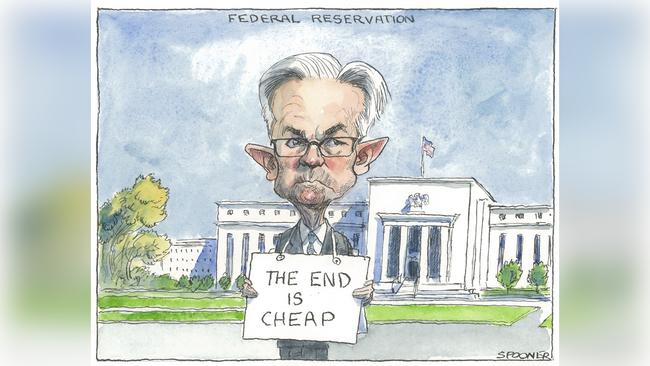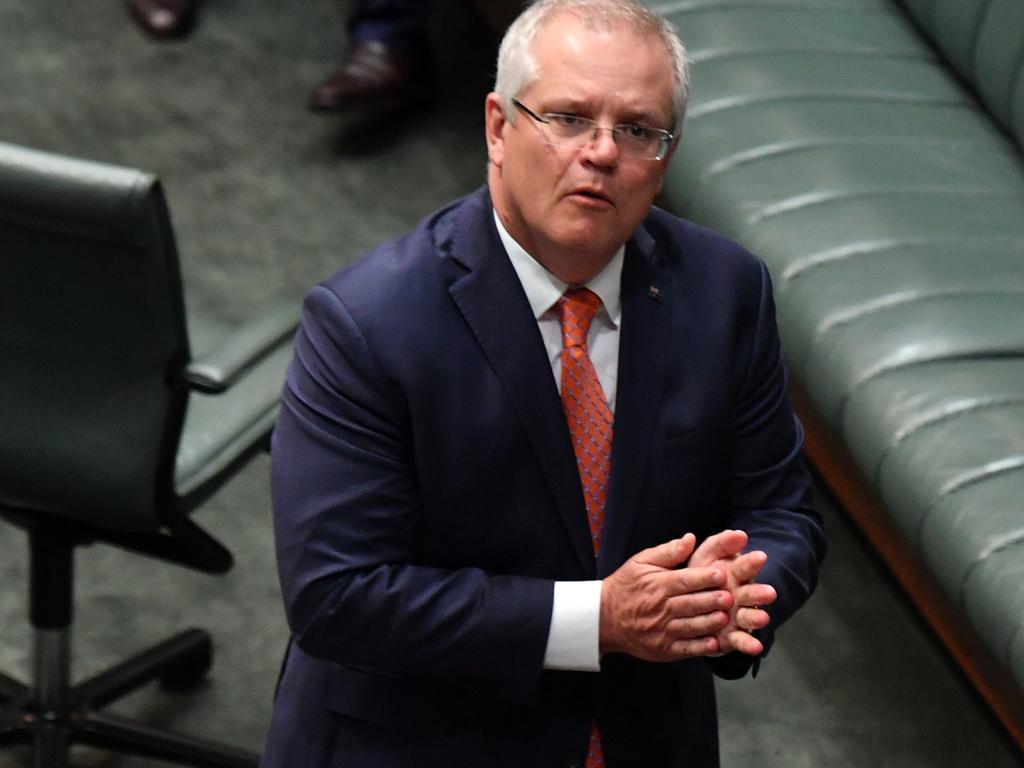
That is good news for stocks on a relative basis compared to other investment choices, but bad news for what it says about the US and global economy.
The S&P 200 index fell 3 per cent on the latter reading with banks and consumer discretionary stocks leading the way down.
The close at 5960 points was 10.8 per cent below the opening for the year at 6745 points, and 17 per cent from the high in February of 7162 points, but 31 per cent above the March lows at 4456.
The rally from the lows was long overdue for a pause.
This made it a bad day for JB Hi-Fi’s Richard Murray to release better-than-expected profit forecasts for the year of around $302m, up 20 per cent on year ago figures, on a 10 per cent increase in sales and against market estimates of a profit around $285m.
The retailer was the beneficiary of some untimed boosts, with expectations that it may be closed down at the start of the pandemic as it was in New Zealand, which meant it went easy on some offshore orders.
When JB was declared an essential service it was too late to ramp orders and instead Murray was the beneficiary of a handy cut in working capital costs and boost to profits.
He enjoyed one wave of sales when the lockdown happened when home offices were established, another in May when the government handouts came through, and the third is happening now as the economy is opening up.
In the initial stage consumers were highly focused, spending as little time as possible in stores to avoid infection from COVID-19, but now they are looking around as malls open up.
The JB Hi-Fi machine rolls on with costs as ever tightly managed.
The $23.3bn equity raising bandwagon rolled on lining investment bank pockets to the tune of $374m, with Alliance Aviation raising $120m and requiring Qantas to hand over $18m or so to maintain its 20 per cent hold on the company.
Still having acquired its blocking stake in February last year at $2.40 a share and the equity raising at $2.95, Qantas is well ahead on this investment.
The expectation is that the next profit season in August will herald another round of equity raisings on the back of the expected disastrous results outside the selected few, such as retailers JB Hi-Fi and Wesfarmers.
Some are using this year to gold plate investments given 2020 is unlikely to be a booming year for executive compensation so costs growth will be high.
Still to come are groundbreaking acquisitions.
Mixed spend messages
The latest National Australia Bank figures showed a bounce in consumer spending last month, but on RBA data actual consumer payments plunged a massive $16bn, or 25 per cent, in April.
The RBA data looks at actual spending, as opposed to ABS data which is based on surveys.
McLean’s Grant Halverson says these are the worst numbers he has seen in 35 years in the game.
Locally, the ABS has reported retail sales as being down 17 per cent but Wesfarmers in a statement earlier this week noted that the downturn is not across the board, with Bunnings and Officeworks reporting increases.
The RBA data also highlights the hype behind “buy now, pay later” stocks given their tiny share of the payments system.
By the RBA data, in April total payments, were down 25 per cent, credit card spending was down 33 per cent, debit card spending down 10.1 per cent, ATMs by 40 per cent and prepaid cards by 51.6 per cent.
These figures, which compare totals in April to those in April last year, and also cast doubt on the so-called boom in online spending, given 92 per cent of all online purchases are made by card.
The Australian payments system measures just over $1 trillion in spending each year with debit cards having the biggest share at 35 per cent, followed by the RBA digital payments platform which has 29 per cent.
Debit card spending totals $300bn and buy now, pay later spending totals $6bn or less than 1 per cent of the market with six million customers. This compares with prepaid cards at $7.3bn and 11.4 million customers.
If we are talking about revolutions led by Afterpay, Zip et al, then it’s a long time coming given Afterpay has been around for five years. It has sales of $US2.3bn, has yet to report a profit, and has a market value of just under $15bn or 25 per cent of the size of ANZ.
CBA has teamed up with BNPL Klarna which has $US29bn in revenues. Globally the 15-year-old industry has $US1.1 trillion in sales against mobile payments in China, which in four years have grown to $US41.7 trillion and credit cards which have taken 62 years to get to $US24.5 trillion.
The BNPL valuations in Australia stretch credibility.
BlueScope tests mettle
Monopoly steel producer BlueScope boss Mark Vassella’s impassioned plea for dumping protection in Australia beggars belief on several fronts.
The company and Vassella’s former executive Jason Ellis are facing an ACCC alleged cartel case based on alleged threats made by Ellis to attempt to organise the domestic market.
There is a case management hearing in the Ellis matter next Tuesday which includes a criminal action of alleged obstruction of justice and one scheduled for BlueScope on August 28 which suggests some time before the main game.
Ellis and BlueScope of course reject any knowledge or involvement in any illegal activities.
The company along with Sanjeev Gupta’s Whyalla long product mill are among the most frequent complainants before the Australian Dumping Commission such that they almost maintain an office in the commission.
Dumping requires imports being sold in Australia at less than the normal price in the country of origin and causes injury to the local producer.
The two legs are required.
Dumping duties impose higher costs for all consumers and in steel this means building and other infrastructure which employs a multiple of those employed by BlueScope.
This said, unfairly priced imports should be stopped.
Australia unlike New Zealand doesn’t treat China as a normal market so it gets a read on market prices by comparing with “like countries”. This means imports from China face a battle to defeat dumping claims.
But the three concerns facing Vassella right now start with the Australian economy, an increase in competitors’ coating galvanised steel to compete with Bluescope’s flagship zincalume and pending dumping reviews of steel pipe and galvanised steel from Taiwan, both of which may go against him.
The bottom line then, his best defence is to concentrate on what he does best which is make competitive steel.








A dose of reality hit stock prices on Thursday in the wake of the US Fed suggestions the next interest rate rise wouldn’t come until 2023, with Fed chair Jerome Powell saying the central bank was “not even thinking about raising interest rates”.